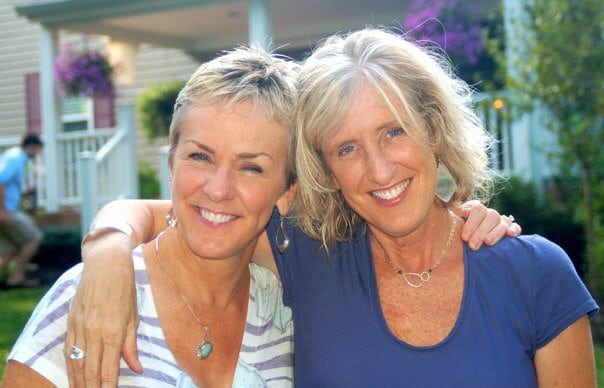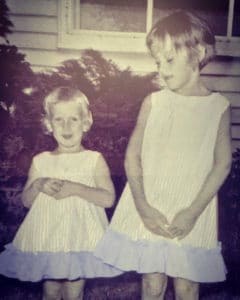 My sister was diagnosed with metastatic spinal cancer in May and died at home 8 months later. She was unusual in that she didn’t want to “fight cancer.” It didn’t mean she was never angry about her diagnosis. She had her moments. She was not a cardboard saint and would be frightfully appalled it’s we tried to make her into one. It was a painful and sometimes frightening journey.
My sister was diagnosed with metastatic spinal cancer in May and died at home 8 months later. She was unusual in that she didn’t want to “fight cancer.” It didn’t mean she was never angry about her diagnosis. She had her moments. She was not a cardboard saint and would be frightfully appalled it’s we tried to make her into one. It was a painful and sometimes frightening journey.
Yet, she knew cancer would be both an unwanted companion and teacher. You can’t live in this world under an illusion of immortality and perfection. We are mortal beings. When we recognize and accept of the reality of the limitations of living, liberation from fear begins.
Janice lived wholeheartedly and when fear arose, she worked hard to press into it and see where it took her. It most always came back to this: she had a terminal cancer diagnosis and her options were limited. She had to face it with courage and on her terms.
David Whyte writes:
Courage is our heartfelt participation with life in which we make conscious the things we already feel deeply and then live with the unending vulnerabilities of those consequences.
Janice knew the sterility of the hospital and rehab centers would crush her soul. She knew that suffering is not as much as a disruption to 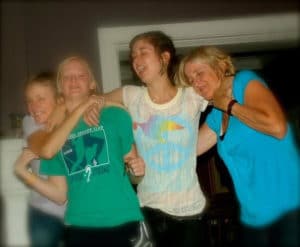 our existence as it is an inevitable part of it. We live in a culture where people don’t talk of these things. Well, she did.
our existence as it is an inevitable part of it. We live in a culture where people don’t talk of these things. Well, she did.
She chose to leave the hospital and return to the sanctuary that was her home and live out her final months there. I believe she lived far longer than expected because she would not allow her body to be poked and prodded and radiated to give her another sick 4 months. By July, she was paralyzed and had to take many meds to manage her pain. Yet, she accepted this in a spirit that was unlike anything I’ve seen.
She had immersed herself for the past 10 years in volunteering at hospice and knew that palliative care is an art. It’s not about “doing battle.” She was not a war metaphor kind of woman. It is about being with. It’s not some cowardly act of giving up. It’s about courage and learning to be okay with not knowing.
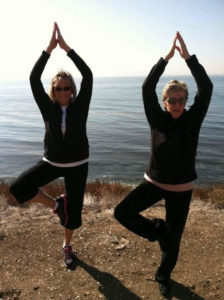
It’s about living with the realities of the end of life with good enough present moments where friends bring Graeters, hubby makes food magic, friends paint your toenails, you boss your sisters around and nieces and nephews bring kids and babies and news from work and school. My mom would come and read while Janice rested. It was immeasurably sad and ultimately life giving in its own way. We hadmany moments of holding hands and listening to music and talking about what she needed to talk about. There were times she couldn’t hear what was going on without her as she wasn’t up for it. Other times she could.
She listened to her body and the present moment and managed things in her way.
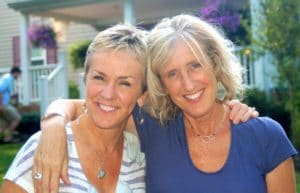 She would talk about things many people avoid. She was irreverent and funny and ridiculous. As we have shared memories of her, most memories of how hard she laughed at our wipeouts in the wrong places and her dry sense of humor when we took ourselves too seriously.
She would talk about things many people avoid. She was irreverent and funny and ridiculous. As we have shared memories of her, most memories of how hard she laughed at our wipeouts in the wrong places and her dry sense of humor when we took ourselves too seriously.
This courageous way of ordinary living will break your heart and repair it in ways you hadn’t imagined. It’s full out courage. I sometimes wonder what she would think about at the end of the day when all the visitors and caregivers went home.
Would all those outer events of the day be brought inward? Would she wonder if all this was really happening? Would she wonder about walking again?
Imagine the courage of letting go and receiving love day after day after day knowing you have to say goodbye. We were saying goodbye to one person. She had to gaze at all these beautiful faces knowing time was brief. She was saying goodbye to all of us.
Perhaps that is why she loved beauty the way she did. The most beautiful things in life are fleeting. The sunset in Hilton Head or in the Manasquan Inlet. The life of a house cat. Janice Willis.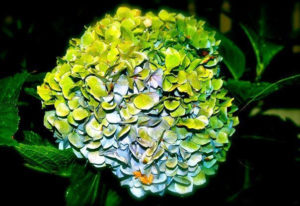
For me and those who loved her, my sister was a homing beacon. Her home was a place to land. Kindness and support was her medicine. Beauty was her sanctuary. Courage was her heart.
I carry all these as my act of remembrance.
David Whyte’s reflection on Courage:
Courage is a word that tempts us to think outwardly, to run bravely against opposing fire, to do something under besieging circumstance, and perhaps, above all, to be seen to do it in public, to show courage; to be celebrated in story, rewarded with medals, given the accolade, but a look at its linguistic origins leads us in a more interior direction and toward its original template, the old Norman French, Coeur, or heart.
Courage is the measure of our heartfelt participation with life, with another, with a community, a work, a future. To be courageous, is not necessarily to go anywhere or do anything except to make conscious those things we already feel deeply and then to live through the unending vulnerabilities of those consequences.
To be courageous is to seat our feelings deeply in the body and in the world: to live up to and into the necessities of relationships that often already exist, with things we find we already care deeply about: with a person, a future, a possibility in society, or with an unknown that begs us on and always has begged us on. Whether we stay or whether we go – to be courageous is to stay close to the way we are made.
– David Whyte
from Readers’ Circle Essay, “Courage”
©2011 David Whyte

